|
|
|
Sort Order |
|
|
|
Items / Page
|
|
|
|
|
|
|
| Srl | Item |
| 1 |
ID:
130908
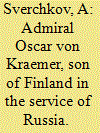

|
|
|
|
|
| Publication |
2014.
|
| Summary/Abstract |
MY ACQUAINTANCE with Oscar von Kraemer began in Denmark, at the museum of the town of Lemvig, in the section dedicated to the shipwreck of the Imperial Russian frigate Alexander Nevsky. I learned about the life of this all-around interesting man when I came across a book published by Finnish historians Bernhard Estlander and Karl Ekman in Helsinki in 1931, entitled "Fran hav och hov" (in the translation from Swedish - "At sea and court"). It is based on the rich
epistolary legacy of von Kraemer, who, in addition, possessed an extraordinary literary gift. This book not only gives an excellent portrayal of this undoubtedly talented man, but is an interesting evidence of an entire era in the history of Russia and its Navy. The name of Kraemer says little to the present generation of Russians and Finns. I do not think that his biography is well known to naval historians of these two countries either. The admiral's personal belongings and papers are kept in the National Archives of Finland and by his descendants living in this country.
|
|
|
|
|
|
|
|
|
|
|
|
|
|
|
|
| 2 |
ID:
116365
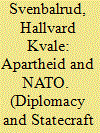

|
|
|
|
|
| Publication |
2012.
|
| Summary/Abstract |
In the 1970s, questions of apartheid and decolonisation rose to the forefront of international political debate. Building on recently declassified, multinational archival research, this analysis assesses the question of whether to impose international economic sanctions against the apartheid regime in both South Africa and white minority-ruled Rhodesia during this decade. The issue of sanctions became a strain on the relationship between Great Britain and the three Scandinavian states-Denmark, Norway, and Britain, were allies within the North Atlantic Treaty Organisation. Wary of communist influence in Africa as well as concerned about protecting their interests on the continent, the British preferred moderate measures and a long-term perspective when dealing with Southern Africa. The Scandinavian Powers, building a reputation as internationalist and progressive states and with few national interests in the area, presented themselves as leading advocates of sanctions against South Africa and Rhodesia. These differences in approach caused recurring tension between the British and their Scandinavian allies, even leading some British officials to suggest sanctioning Norway and Sweden for their Southern Africa policy. However, the end of white minority rule in Rhodesia in 1980 as well as the increasing focus on European security matters during the second Cold War of the early 1980s reduced Anglo-Scandinavian tension over Southern Africa, with the Powers continuing their close relationship throughout and beyond the Cold War.
|
|
|
|
|
|
|
|
|
|
|
|
|
|
|
|
| 3 |
ID:
112057
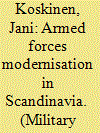

|
|
|
| 4 |
ID:
121578
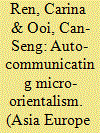

|
|
|
|
|
| Publication |
2013.
|
| Summary/Abstract |
Using the concepts of auto-communication and micro-Orientalism, this article argues that nation branding at World Expos produces and propagates notions of difference and Otherness. We examine how Denmark presents itself in China, and how the message inevitably tells how the Danish authorities view the Chinese. Using the Danish 'Welfairytales' pavilion at the 2010 World Expo in Shanghai, we show how the national self is performed in two versions. One attempts to communicate 'the good Danish life' to the Danes themselves, while the other claims Occidental superiority. The case shows how the Danish exhibition is performed and regulated as sustainable and authentic and how in spite of its seemingly dialogical and interactive layout, a number of auto-communicative and micro-Orientalist practices are enacted. This study is based on field participation, observations and interviews. Public sources of information are also used.
|
|
|
|
|
|
|
|
|
|
|
|
|
|
|
|
| 5 |
ID:
066193


|
|
|
| 6 |
ID:
192893
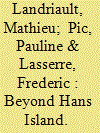

|
|
|
|
|
| Summary/Abstract |
The governments of Canada and Denmark signed a historic agreement on Hans Island on 14 June 2022. Although most of the agreement was devoted to the resolution of the Hans Island dispute, it also settled other issues. We argue that provisions on mobility and the continental shelf in the Labrador Sea give rise to interesting precedents that could have far-reaching effects for northerners. The agreement on enhanced mobility could represent a first step in a more ambitious process of facilitating Inuit mobility across Nunavut and Greenland, while the settlement on the continental shelf illustrates how states could collaborate on other continental shelf cases, including the continental shelf in the Central Arctic Ocean.
|
|
|
|
|
|
|
|
|
|
|
|
|
|
|
|
| 7 |
ID:
180568
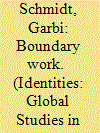

|
|
|
|
|
| Summary/Abstract |
Theoretically, this article investigates the politicisation of migration research in relation to boundary work between different spheres of the Danish public debate about migration, including research, media and politics. Empirically, the article analyses the roles that Danish migration researchers have played in such debates over the last two decades. Besides, the article presents and analyses results from a survey among migration researchers employed in four of Denmark’s six universities. The survey showed that while the majority of respondents did not feel unsafe participating in the public debate about migration, more than two out of five did. Jeopardising one’s professional reputation appeared to be a major concern. The article ends with a discussion of the survey results in relation to academic boundary work and presents suggestions for the road ahead, both for individual researchers and academic institutions.
|
|
|
|
|
|
|
|
|
|
|
|
|
|
|
|
| 8 |
ID:
138288


|
|
|
|
|
| Summary/Abstract |
North Atlantic Treaty Organization (NATO) members such as Canada and Denmark have transformed their military forces to better engage in expeditionary warfare. They are incorporating advanced technologies to find and strike targets precisely from great distances at little risk to themselves. The persistence of unmanned aerial vehicles (UAVs) represents the next step in modern airpower’s long-range reconnaissance/precision strike complex and has transformed ground operations. Nonetheless, operational requirements in Afghanistan caught Canada and Denmark flat-footed. Ultimately, Canada effectively used UAVs while Denmark could not. Moreover, neither state has a UAV capability beyond small tactical systems (although each has plans to develop or join in the development of larger ones). The Canadian and Danish experiences suggest that ground forces are most likely to acquire and integrate small UAVs into their force structures and concepts of operation and that the air forces of small- and medium-sized Western countries will likely do so only in cooperation with others. It is here that the Canadian and Danish UAV paths may yet again cross.
|
|
|
|
|
|
|
|
|
|
|
|
|
|
|
|
| 9 |
ID:
111507
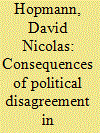

|
|
|
|
|
| Publication |
2012.
|
| Summary/Abstract |
Political disagreement in interpersonal communication increases attitudinal ambivalence and can depress voter turnout. These effects seem to be driven by a wish to avoid social controversy rather than informational gains from encountering other opinions. This article shows that political disagreement in interpersonal communication increases the difficulty of deciding for which party to vote. Moreover, this effect is a result of social disapproval of one's party preference, while political expertise in interpersonal communication has no effect. For voter turnout, no direct effect of social disapproval of one's party preference is found. However, disapproval has an indirect influence on turnout via difficulty of vote choice. In sum, both political attitudes and political behaviour are affected by social pressures. Students of political attitudes and behaviour should try to include interpersonal discussion in their models in greater detail than is common practice today.
|
|
|
|
|
|
|
|
|
|
|
|
|
|
|
|
| 10 |
ID:
137928
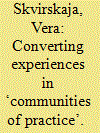

|
|
|
|
|
| Summary/Abstract |
This article looks at ‘educational’ migration instigated by the Danish programme of agricultural apprenticeships, which since the late 1990s has brought many young Ukrainians to rural Denmark. It discusses discrepancies between the logic of achievement implied by the programme’s ideology on the one hand, and Ukrainian apprentices’ aspirations to social mobility on the other hand. In this way, the article questions the concept of ‘community of practice’ that has been used to describe the formation of a social persona sharing the values of this community. Using ethnographic case studies of former apprentices, I argue that while apprenticeships often fail to produce a shared social and professional identity within a community of practice, there are many ways in which the experiences afforded by Danish apprenticeships lead to (sometimes unforeseen) achievements.
|
|
|
|
|
|
|
|
|
|
|
|
|
|
|
|
| 11 |
ID:
080852
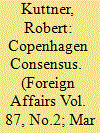

|
|
|
|
|
| Publication |
2008.
|
| Summary/Abstract |
Denmark has forged a social and economic model that couples the best of the free market with the best of the welfare state, transcending tradeoffs between dynamism and security, efficiency and equality. Other countries may not be able to simply copy the Danish model of social democracy, but it nonetheless offers important lessons for governments confronting the dilemmas of globalization.
|
|
|
|
|
|
|
|
|
|
|
|
|
|
|
|
| 12 |
ID:
074226


|
|
|
|
|
| Publication |
2005.
|
| Summary/Abstract |
The paper discusses a still more obvious foreign policy dilemma facing Denmark: On the one hand, Denmark has made a proactive foreign policy decision to pursue a strategy of influence with the European Union as the most important international forum. On the other hand, Denmark has chosen to stay outside the increasingly important cooperation on defence policy within the EU. As a small state, Denmark is opting for a multilateral strategy, but it has deliberately chosen to limit its commitment to the same forum. A combination of adaptation theory and theory of small states informs the analysis. It is argued that the Danish opt-out sends an unclear and inconsistent signal to Denmark's partners which again hampers the possibilities for using Danish coalition power within the EU. Nevertheless, contrary to both theoretical expectations and common sense intuition, there is little to suggest that the opt-out has had negative consequences for Denmark's influence on capabilities in the EU.
|
|
|
|
|
|
|
|
|
|
|
|
|
|
|
|
| 13 |
ID:
069152
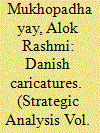

|
|
|
| 14 |
ID:
115271
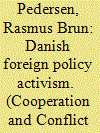

|
|
|
|
|
| Publication |
2012.
|
| Summary/Abstract |
Danish foreign policy is under transformation. Different versions of activism have gradually replaced adaptation and lately Denmark has participated more actively and independently in world politics than ever before. The core in activism is based on a liberal value system that seems to have replaced the adaptation logics dominating Danish foreign policy during the Cold War. Activism has evolved from a multilateral inspired activism in the 1990s to a more Atlantic centred activism during the 2000s. While analysts see the different phases as opposites, my argument is that the types of activism should be seen as a difference of degree rather than a difference of kind. 'Activism' as a foreign policy strategy, however, should be considered analytically as a difference in kind from the adaptation strategies that dominated Danish foreign policy during the Cold War. The main driving force behind this transformation can be found domestically in the Liberal Party's dominant position in Danish politics.
|
|
|
|
|
|
|
|
|
|
|
|
|
|
|
|
| 15 |
ID:
089898
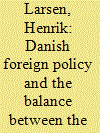

|
|
|
|
|
| Publication |
2009.
|
| Summary/Abstract |
In the international debate, it is often argued that Denmark, in its major foreign policy priorities, has sided with the United States (US) since the Cold War rather than with the European Union (EU) or its European partners. I examine whether this is correct, and if it is, why this is so, since 2001. I also ask whether a different theoretical approach, namely discourse analysis, would lead to findings different from those of the dominant approaches. I first present various ways of explaining why a country chooses the balance that it does between the EU and the US. One particular approach, post-structuralist discourse analysis, is applied. The balance between the EU and the US in the dominant Danish discourse is analysed. I outline the policy level and attempt to map where Danish policies are conducted with the EU and the US, respectively. I show that the EU is the most important partner across foreign policy areas since 2001, despite ad hoc foreign policy cooperation with the US, and that this is due to a dominant discourse articulating the EU as `our most important alliance'. However, the US is the most important partner on military security issues based on a discourse articulating cooperation with the US as a central part of Danish foreign policy identity and an `offensive foreign policy'.
|
|
|
|
|
|
|
|
|
|
|
|
|
|
|
|
| 16 |
ID:
095087
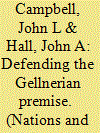

|
|
|
|
|
| Publication |
2010.
|
| Summary/Abstract |
The teleological functionalism of Gellner's theory of nationalism has been much criticised. Attention here is on a different matter, namely Gellner's basic premise - that national homogeneity is a condition for societal success. We defend this view in a particular way - by showing that small, culturally homogeneous countries have advantages that often enhance their socioeconomic performance. They can coordinate policy in ways that help them respond successfully to the vulnerabilities of smallness. These capacities stem in part from the common bonds of nationalism and the resulting institutional capabilities for co-operation, sacrifice, flexible manoeuvring, and concerted state action. The argument is supported by a detailed analysis of the Danish case - a country whose impressive success has been deeply marked both by a diminution in size and an increase in national homogeneity. Less detailed examples of other countries are also presented. The conclusion urges caution as to the policy implications of the argument.
|
|
|
|
|
|
|
|
|
|
|
|
|
|
|
|
| 17 |
ID:
100087
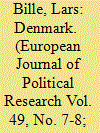

|
|
|
| 18 |
ID:
108986


|
|
|
| 19 |
ID:
091749
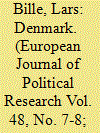

|
|
|
| 20 |
ID:
072795


|
|
|
|
|
| Publication |
2005.
|
| Summary/Abstract |
Denmark appeared to be caught in several difficult political dilemmas when the United States government indicated its desire to upgrade facilities at Thule Air Base in Greenland for a role in missile defence. Domestic politics and constitutional relations between Greenland and Denmark were at the heart of the problem. Would a 'Yes' to the American request inflame the movement for independence in Greenland? Would a 'No' leave Denmark, which had earlier opted out of EU defence cooperation, without strong allies? And would a democratic debate on the issue jeopardize a government policy in favour of 'Yes'? After years of consultations, debate and negotiations, approval from both the Greenland government and the Danish Parliament was obtained. Rather than being resolved, the dilemmas were bypassed. The strategic and military issues of missile defence were overshadowed when Greenland used the occasion to take one more step towards independence. In Denmark the remoteness of Thule and a sense that supreme interests are at stake limit public debate.
|
|
|
|
|
|
|
|
|
|
|
|
|
|
|
|
|
|
|
|
|